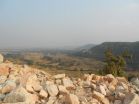(Press-News.org) The Ebola crisis in west Africa could have been averted if governments and health agencies had acted on the recommendations of a 2011 World Health Organisation (WHO) Commission on global health emergencies, according to a new Comment, published in The Lancet.
The Comment, written by Professor Lawrence Gostin, Faculty Director of the O'Neill Institute for National & Global Health Law at Georgetown University, USA, calls for renewed international commitment to a health systems contingency fund to prevent another infectious disease crisis, together with long-term funding for enduring health systems development.
Although WHO has now implemented a plan for dealing with Ebola – five months after the virus first began to spread internationally – implementation will be further delayed while US$490 million are raised to meet the cost of tackling the epidemic. In the meantime, Ebola continues to spread amongst health workers and the general population, in countries where health resources were already strained before the outbreak.
The 2011 WHO Review Committee proposed a Global Health Emergency Workforce, backed by a US$100 million contingency fund, which would have enabled the rapid initial response needed to contain the Ebola outbreak, but the Commission was not acted upon by WHO, lacking sufficient financial commitment from governments in high-income countries.
According to Professor Gostin, "How could this Ebola outbreak have been averted and what could states and the international community do to prevent the next epidemic? The answer is not untested drugs, mass quarantines, or even humanitarian relief. If the real reasons the outbreak turned into a tragedy of these proportions are human resource shortages and fragile health systems, the solution is to fix these inherent structural deficiencies."
"A dedicated International Health Systems Fund at WHO would rebuild broken trust, with the returns of longer, healthier lives and economic development far exceeding the costs. This fund would encompass both emergency response capabilities and enduring health-system development."
"The west African Ebola epidemic could spark a badly needed global course correction that would favour strong health infrastructure. Sustainable funding scalable to needs for enduring health systems is a wise and affordable investment. It is in all states' interests to contain health hazards that may eventually travel to their shores. But beyond self-interest are the imperatives of health and social justice—a humanitarian response that would work, now and for the future."
INFORMATION: END
The Lancet: International health systems fund could have averted Ebola outbreak
Commitment needed now to prevent another crisis
2014-09-04
ELSE PRESS RELEASES FROM THIS DATE:
2014 Breast Cancer Symposium highlights research advances in prevention, screening, therapy
2014-09-04
ALEXANDRIA, Va. – Five studies from the 2014 Breast Cancer Symposium were highlighted today in an embargoed presscast for reporters. Presentations focused on new studies exploring preventive mastectomy, compliance with recommended screening mammography, and risk of recurrence after pre-surgery therapy for breast cancer. The Symposium will take place September 4-6, 2014, at the San Francisco Marriott Marquis in San Francisco, CA.
Five major studies were highlighted in today's presscast:
Angelina Jolie's Story May Have Helped Double BRCA Testing Rates at a Canadian Cancer ...
Messenger molecules identified as part of arthritis puzzle
2014-09-04
The way in which some cells alter their behaviour at the onset of osteoarthritis has been identified for the first time by researchers at the University of Liverpool.
The study was funded by medical research charity Arthritis Research UK.
The trigger for arthritis is still to be fully defined, but it is known that injuries, obesity or old age can all increase the risk for arthritis, and lead to cells in the affected joint altering their behaviour.
The research team from the University's Institute of Ageing and Chronic Disease has now found that changes in the rate ...
Researcher advances a new model for a cosmological enigma -- dark matter
2014-09-04
LAWRENCE — Astrophysicists believe that about 80 percent of the substance of our universe is made up of mysterious "dark matter" that can't be perceived by human senses or scientific instruments.
"Dark matter has not yet been detected in a lab. We infer about it from astronomical observations," said Mikhail Medvedev, professor of physics and astronomy at the University of Kansas, who has just published breakthrough research on dark matter that merited the cover of Physical Review Letters, the world's most prestigious journal of physics research.
Medvedev proposes a ...
Atomically thin material opens door for integrated nanophotonic circuits
2014-09-04
A new combination of materials can efficiently guide electricity and light along the same tiny wire, a finding that could be a step towards building computer chips capable of transporting digital information at the speed of light.
Reporting today in The Optical Society's (OSA) high-impact journal Optica, optical and material scientists at the University of Rochester and Swiss Federal Institute of Technology in Zurich describe a basic model circuit consisting of a silver nanowire and a single-layer flake of molybendum disulfide (MoS2).
Using a laser to excite electromagnetic ...
Trinity geologists re-write Earth's evolutionary history books
2014-09-04
Geologists from Trinity College Dublin have rewritten the evolutionary history books by finding that oxygen-producing life forms were present on Earth some 3 billion years ago – a full 60 million years earlier than previously thought. These life forms were responsible for adding oxygen (O2) to our atmosphere, which laid the foundations for more complex life to evolve and proliferate.
Working with Professors Joydip Mukhopadhyay and Gautam Ghosh and other colleagues from the Presidency University in Kolkata, India, the geologists found evidence for chemical weathering of ...
Study: Oxidized LDL might actually be 'good guy'
2014-09-04
LEXINGTON, Ky (Sept. 4, 2014) -- A team of investigators at the University of Kentucky has made a thought-provoking discovery about a type of cholesterol previously believed to be a "bad guy" in the development of heart disease and other conditions.
Jason Meyer, a University of Kentucky MD-PhD candidate, worked with Deneys van der Westhuyzen, Ph.D., a Professor in the Departments of Internal Medicine and Molecular and Cellular Biochemistry, to study the role oxidized LDL plays in the development of plaque inside artery walls.
According to Meyer, the medical research ...
Research shows declining levels of acidity in Sierra Nevada lakes
2014-09-04
RIVERSIDE, Calif. — California's water supply depends on a clean snow pack and healthy mountain lakes. The lakes receive a large amount of runoff in the spring from the melting snowpack. If the snowpack is polluted, the lakes will be polluted.
James O. Sickman, an environmental scientist at the University of California, Riverside, has conducted research on lakes in the Sierra Nevada—the most sensitive lakes in the U.S. to acid rain, according to the Environmental Protection Agency—and described human impacts on them during the 20th century. The research was done by ...
New research offers help for spinal cord patients
2014-09-04
Many patients suffer from severe spinal cord injuries after being involved in traffic accidents or accidents at work. An injury to the spinal cord is a catastrophe for the individual, and often results in complete or partial paralysis of the person's arms and legs. Despite the paralysis, several patients experience problems with involuntary muscle contractions or spasms which impair the patient's quality of life.
The movements are due to the neurotransmitter serotonin, which normally plays a crucial role in relation to our voluntary control of movements by reinforcing ...
Mantle plumes crack continents
2014-09-04
In some parts of the Earth, material rises upwards like a column from the boundary layer of the Earth's core and the lower mantel to just below the Earth's crust hundreds of kilometres above. Halted by the resistance of the hard crust and lithospheric mantle, the flow of material becomes wider, taking on a mushroom-like shape. Specialists call these magma columns "mantle plumes" or simply "plumes".
Are mantel plumes responsible for the African rift system?
Geologists believe that plumes are not just responsible for creating volcanoes outside of tectonically active areas ...
Implact of dexamethasone on intelligence and hearing in preterm infants
2014-09-04
Glucocorticoids are speculated to have a long-term impact on the development of the nervous system and increase the incidence of cerebral palsy in preterm infants. The existing studies concerning the role of dexamethasone in preterm infants are insufficiently reliable owing to short follow-up periods and small sample sizes in clinical studies, or the absence of randomized controlled trials. Ruolin Zhang and co-workers from the Second Xiangya Hospital, Central South University in China conducted a meta-analysis of 10 relevant randomized controlled trials. They found that ...
LAST 30 PRESS RELEASES:
Learning makes brain cells work together, not apart
Engineers improve infrared devices using century-old materials
Physicists mathematically create the first ‘ideal glass’
Microbe exposure may not protect against developing allergic disease
Forest damage in Europe to rise by around 20% by 2100 even if warming is limited to 2°C
Rapid population growth helped koala’s recovery from severe genetic bottleneck
CAR-expressing astrocytes target and clear amyloid-β in mouse model of Alzheimer’s disease
Unique Rubisco subunit boosts carbon assimilation in land plants
Climate change will drive increasing forest disturbances across Europe throughout the next century
Enhanced brain cells clear away dementia-related proteins
This odd little plant could help turbocharge crop yields
Flipped chromosomal segments drive natural selection
Whole-genome study of koalas transforms how we understand genetic risk in endangered species
Worcester Polytechnic Institute identifies new tool for predicting Alzheimer’s disease
HSS studies highlight advantages of osseointegration for people with an amputation
Buck Institute launches Healthspan Horizons to turn long-term health data into Actionable healthspan insights
University of Ottawa Heart Institute, the University of Ottawa and McGill University launch ARCHIMEDES to advance health research in Canada
The world’s largest brain research prize awarded for groundbreaking discoveries on how we sense touch and pain
Magnetofluids help to overcome challenges in left atrial appendage occlusion
Brain-clearing cells offer clues to slowing Alzheimer’s disease progression
mRNA therapy restores fertility in genetically infertile mice
Cloaked stem cells evade immune rejection in mice, pointing to a potential universal donor cell line
Growth in telemedicine has not improved mental health care access in rural areas, study finds
Pitt scientists engineer “living eye drop” to support corneal healing
Outcomes of older adults with advanced cancer who prefer quality of life vs prolonging survival
Lower music volume levels in fitness class and perceived exercise intensity
Of crocodiles, counting and conferences
AERA announces 2026 award winners in education research
Saving two lives with one fruit drop
Photonic chips advance real-time learning in spiking neural systems
[Press-News.org] The Lancet: International health systems fund could have averted Ebola outbreakCommitment needed now to prevent another crisis



